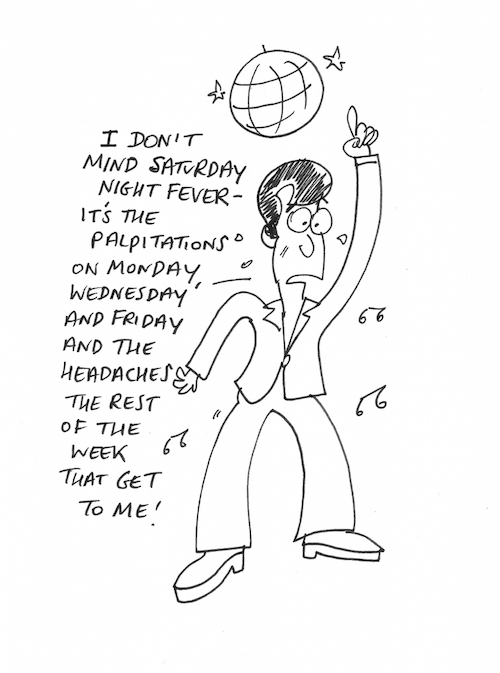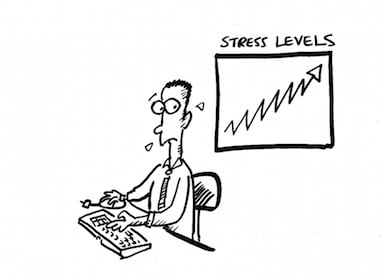Beat Stress for Men’s Health Week
This week is Men’s Health Week, a national initiative that aims to help increase awareness about men’s health issues.
This year, it’s all about stress; how to recognise it, how to talk about it, and how to beat it. While all adults experience stress, too many men don’t talk and take action when it comes to their physical and mental health.
By raising awareness about how to recognise, understand and manage stress, Men’s Health Week hopes to help break down stigmas and encourage men to take their health seriously.
What is stress?

Stress is a normal part of life – yet many of us never consciously learn how to recognise it. From a physiological perspective, our bodies respond to stressful situations by sending adrenaline rushing through the body, increasing heart rate and boosting mental and physical alertness. We experience the ‘fight or flight’ response; we feel sweaty, tingly and get butterflies.
To our Palaeolithic ancestors, the fight or flight response was an important evolutionary survival strategy – it helped us cope with physical threats to safety.
In today’s modern world, the fight or flight response is rarely needed – the ‘threats’ we feel are much less serious to our immediate safety, and tend to take the form of work pressures, family struggles and other daily stresses.
Stress still triggers the same response in our bodies however, and we end up experiencing less serious but more frequent fight or flight responses. Over time, too much adrenaline and cortisol – known as the stress hormone – can have a negative impact on our immune system, heart and physical and mental well-being.
What causes stress?
Stress can be caused by a number of different factors, and everyone is impacted differently. Here are some of the most common causes of stress today:
- Work
- Unemployment
- Money
- Partners, friends and family (and their absence)
- Bereavement or change
- Sex and sexuality
- Drink and drugs
- Addiction
Short-term stresses are a normal part of life, but it’s when you start having long-term problems that stress can begin to mount and negatively impact your health.
Understanding the signs
Recognising a build up of stress in your life can help you take steps to manage it before it impacts you further. Common signs of stress are:
- Eating more or less than normal
- Feeling low self esteem
- Mood swings
- Disrupted sleep – sleeping more or less than usual
- Lacking in energy, feeling tired
- Withdrawing from family and friends
- Losing interest in things you usually enjoy
- Headaches, irritable bowel syndrome, aches and pains
- Poor memory or forgetfulness
Beating stress

There are many things you can do to manage stress and keep it from negatively impacting your life. Things like exercise, volunteering, painting, writing, singing, dancing and listening to music are all simple activities you can try to help relieve your stress.
Talking is important, too – being able to connect with family or friends and share how you’re feeling often helps release stress and see a solution we couldn’t alone.
Don’t rely on stress to disappear on its own. Old fashioned ideas about what it means to be a man can sometimes prevent men from discussing feelings of sadness, hurt, rejection and discomfort.
Instead of seeing silence as a sign of strength, see honesty as one instead. Having a chat with someone doesn’t need to be a big deal; you can casually talk about some of your feelings while you’re doing other activities.
If you’re worried about another friend or family member who is struggling, sometimes it’s as simple as asking how they are doing and providing an opportunity to have their concerns taken seriously without making it too big a deal. Keep in touch and ask if there’s anything you can do to be there for them.
If stress starts to feel like it’s too much to cope with, you don’t need to struggle alone – speak to your GP or a stress counsellor if you feel like depression, anxiety or stress is taking its toll on other aspects of your life.
Want to know more about Men’s Health Week? Find more information online from the campaign website.
How do you deal with stress? Let us know in the comments below!
Rachel - Silversurfers Assistant Editor
Latest posts by Rachel - Silversurfers Assistant Editor (see all)
- Warming Soups - November 15, 2024
- What’s your favourite scary film? - October 26, 2024
- Easy Traybakes for National Baking Week - October 14, 2024
- Practical tips for living with arthritis - October 11, 2024
- 10th October is World Mental Health Awareness Day - October 8, 2024





















